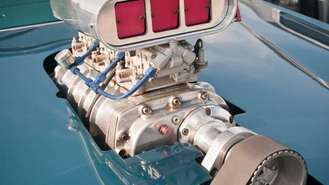

Original article by Kevin Woo at yourmechanic.com
Understanding Performance Vehicles
There are a lot of us who want a little red Corvette in our lives. It’s fast, handles well, and let’s face it, a high performance car makes you look good on an open and windy road.
You might be tempted to think that taking a regular coupe or sedan and pushing it to its limit might replicate the characteristics of a performance car. You’d be wrong. Regular cars aren’t even close to a high performance machine.
Performance cars are built for speed. Of course, along with speed comes superior handling and braking systems to support it. But traveling “fast” in an everyday car is nothing close to pushing it in a car built for speed.
Characteristics of a performance car
Many high performance car aficionados can feel its quality before the car even moves. High performance cars tend to come with high end seats that hold you tight. The reason? The tight, wrap-around seats are designed to keep you firmly in place as you whiz around corners or turns on the open road.
If the seats hug your body, you know you’re in a car built to perform.
Other characteristics of a high performance car include very tight and responsive steering, the ability to hug curves and turn into and out of corners flawlessly is unmistakeable.
Oh, and another characteristic that we can’t forget, the adrenaline rush when you and your car are in sync.
Muscle cars aren’t necessarily performance cars
Some people see muscle cars and performance cars as one in the same. But there’s a difference. Muscle cars are designed to go fast in a straight line. They’re often outfitted with “sports packages” that give the illusion of being a performance car but they’re not. They’re missing two key differentiators - superior handling and braking.
How do you measure performance
There’s no right or wrong way to measure the performance of a car. Some people judge performance based on their 0 to 60 mph (96 kmh) time. With that as the criteria, cars that are familiar to the masses, such as the Porsche 911 Turbo S would make the list at a screaming 2.9 seconds, as would the Nissan GT-R, which also clocks in at 2.9 seconds.
Handling is another measurement. When driving on test tracks, how does the car handle on successive left and right turns, and how quickly does it straighten out? This is a big differentiator between performance cars and muscle cars. The steering and suspension on a performance car is superior.
Performance is also measured by the car’s ability to brake. If you’re driving fast the ability to slow down is vitally important.
Price
Performance cars come in all price ranges. There are inexpensive cars (less than $30,000), such as the Ford Mustang that perform well around town and city highways. And there are mega expensive brands such as a Koenigsegg CCXR Trevita, which will set you back a cool $4.8 million. There are only three of these in the world so good luck finding one.
The downsides of owning a performance car
What downside could there possibly be when driving a fast car knowing that you’re the envy of everyone but the police?
Well first, you’re going to pay higher insurance premiums. Even if you buy a used performance car, such as a 20-year old Lamborghini, your insurance company will classify it as a car built for speed and handling. From the insurance company’s perspective, the driver of a high performance car is likely to behave very differently than if he or she were driving a Mini Cooper.
An insurance company will consider the Lamborghini’s engine size, top speed, handling, and safety ratings when calculating your premium. These numbers are going add up to more than the average car so you’re going to pay more in premiums.
And to add to your insurance woes, if you get a couple of tickets or you’re caught by the police driving over 90 mph you’ll get arrested in most states. If this happens you could find yourself without an insurance carrier. Let’s get real, 90 mph (144 kmh) is nothing in a high performance car, and you’re likely to push your car way past that when the opportunity presents itself.
Performance cars that won’t break the bank
Below are some performance cars that won’t break the bank. While they don’t offer the same performance as an expensive brand, they still provide better than average performance at a relatively inexpensive price.
- Ford Mustang (Then talk to us about a Shelby Mod!)
- Honda Civic Si
- Hyundai Genesis Coupe
- Subaru Impreza WRX
- Dodge Challenger
- Mitsubishi Lancer Evolution
Worst selling performance cars
These are some of the worst selling performance cars. But this is probably due to their higher price points rather than the car’s desirability.
- BMW Z4
- Nissan GT-R
- Kia K900
- Audi TT
- Audi R8
- Dodge Viper SRT
Owning a performance vehicle can add to your fun factor. Spend some time test driving some cars on windy roads to see how they handle. Take along a friend or two to get some feedback on how it feels in the passenger seat and backseat. You never know, when you find the right car and close the deal, you and your friends might be in for more spontaneous joy rides.
How to Choose the Right Supercharger for Your Car
Original article created by CarsDirect.com, March 15, 2012
There's more to consider in a supercharger than horsepower, such as the type of supercharger technology, installation options, and staying street legal. At Dale Adams Automotive we have installed more superchargers than we can count and as we are official suppliers for Whipple, Procharger and Magnuson superchargers we want to give you the knowledge you need to make the right decision.
The right supercharger for your vehicle will be based on several factors. It's important that you consider more than just the price when you start shopping for yours. Here are a few things you should look at when you decide to purchase and install one.
Gather Your Information
 You need to know the make and model of your car, and the year, size and type of the engine. Superchargers are available for many different types of engines, and you will need this information to find the right types of superchargers or blower kits for your car.
You need to know the make and model of your car, and the year, size and type of the engine. Superchargers are available for many different types of engines, and you will need this information to find the right types of superchargers or blower kits for your car.
Think about Horsepower
If you are looking at installing a supercharger in a vehicle you are going to drive daily, you want to keep the car street legal. Some superchargers are designed for racing, and will not pass standard street legal considerations. If you want to amp up the performance for racing, then you need to get a racing package. You can find superchargers for street, drag racing, show, and even some marine applications.
Look at Warranties
While most people use price as a deciding factor, the warranty should play an important role as well. A cheap supercharger kit won't be worth the savings if it doesn't include some type of warranty. Reputable manufacturers, such as Whipple, Magnuson and ProCharger, offer standard warranties and some have the the option to purchase extended warranties. Since superchargers can cost thousands of dollars it's important to make sure your investment is protected.
Consider the Type of System

- Root supercharger. This is the oldest type of supercharger system available. The root systems use large quantities of air in the intake manifold. It offers quick bursts of excess energy, and is popular in racing vehicles. These systems are more inexpensive compared to the other types of superchargers available. This type of supercharger is generally mounted on top of the engine, and is quite large.
- Twin screw supercharger. This works by pulling air through lobes. The air becomes trapped in the rotor housing. From there it is compressed through a cone shaped taper. These tend to be more expensive than other types of superchargers. They also tend to be noisy. These systems may not be street legal in all states.
- Centrifugal supercharger. This uses a powered impeller to draw air in to a compressor at high speeds. The impeller can reach speeds of 60,000 RPM easily. As the air is drawn in, it is converted in to a high pressure air that is pushed through the system. These systems are the most efficient systems available to supercharge a car or truck with.
Consider Installation Options
The way the supercharger is installed depends on the type of blower kit your purchase. Some are easier to install than others. A root supercharger requires more room, and a special cut out hood. A centrifugal supercharger is going to be the most complicated to install, and is best left to professionals. Although kits do exist for those who have some experience working with cars. The Dale Adams team are experts at Supercharger installations, though you can always do it yourself we recommend you come talk to our team about your installation options. We can also measure and tweak the performance by using our Dyno to test torque and all your performance stats.
Look at Cost
The last factor when choosing the best design for your car should be cost. Once you have everything else in order, you can start to shop for the best price. Expect to pay anywhere from $2500 to $10000+ for an aftermarket supercharger kit. This will depend on the type of engine you have. You can use comparative websites to look at several prices. Some of these sites will include information from local auto parts stores as well. The shopping process should be given time. Don't just jump at the first cheap price you find. Instead, take some time to investigate the company offering it. Make sure they are legitimate and are offering exactly what you need before giving away several thousand dollars. Though we are official Whipple, ProCharger and Magnuson supercharger experts, we have installed many brands. If you need advice and want to compare pricing, give us a call.
Tips for Maintaining Your Supercharged Car
Maintaining a supercharged car won't be much different than maintenance on any other vehicle. There are a few key differences, and some things that need to be watched for.
- Check oil levels. While it's important to keep proper oil levels on any vehicle, supercharged cars need to have special attention paid to this. The supercharge process creates more stress on the engine, and without proper lubrication you can face very costly repairs later. Create a maintenance schedule that includes regular oil changes, and stick with it. It's not a good idea to use a synthetic oil in cars with a supercharger. The synthetic oil may last longer, but many car enthusiasts suggest using a conventional oil.
- Use clean filters. A supercharged car relies on clean filters to perform at their maximum. A clogged or otherwise dirty filter will create more strain on the system, and can actually lead to more damage. An air filter in a supercharged vehicle will need to be replaced more often than in other types of vehicles. It's a good idea to change the air filter with every oil change.
- Watch the clutch. Because of the added performance with a supercharged car, they tend to be driven much harder. This type of driving can lead to problems with the clutch because of the abuse that it takes. Have the clutch inspected regularly to avoid problems later.
- Check tire alignment. For the same reason the clutch tends to go out quickly in a supercharged car, the tire alignment can get out of balance. It's a good idea to have the tires balanced regularly, and expect to spend extra money replacing tires more frequently with a supercharged vehicle.
-
Use the best gasoline. If you've already spent the money on upgrading your car to a supercharged system, it's worth the extra money to use the right fuel. Using fuel grades that are low will lead to poor performance, and can create excess gunk in the engine. Most manufacturers suggest at least a premium fuel, if not a premium plus level gas. You may save a few bucks at the pump to purchase cheap fuel, but your performance will suffer, and you may find yourself sinking more money in to engine repairs later down the road.

- Upgrade the cooling system. A supercharged car relies heavily on the coolant system. Superchargers create excess temperatures in the engine compartment of the car. An engine that is allowed to get too hot will end up costing potentially thousands of dollars in repairs later. This is so important with a supercharged car that many manufacturers suggest upgrading the temperature gauges. It's a good idea to regularly check the coolant levels, and stop running the car immediately if the temperature gauge creeps up even a little bit.
We hope you found these tips helpful in your search for more power. It's a tough decision to make and each vehicle is different. Give us a call to talk about all of your performance needs and dreams. Dale and his staff are experts and will help you make the right decision. Happy driving!
Dale Adams
© Copyright 2026 Dale Adams Automotive Services. All Rights Reserved.





